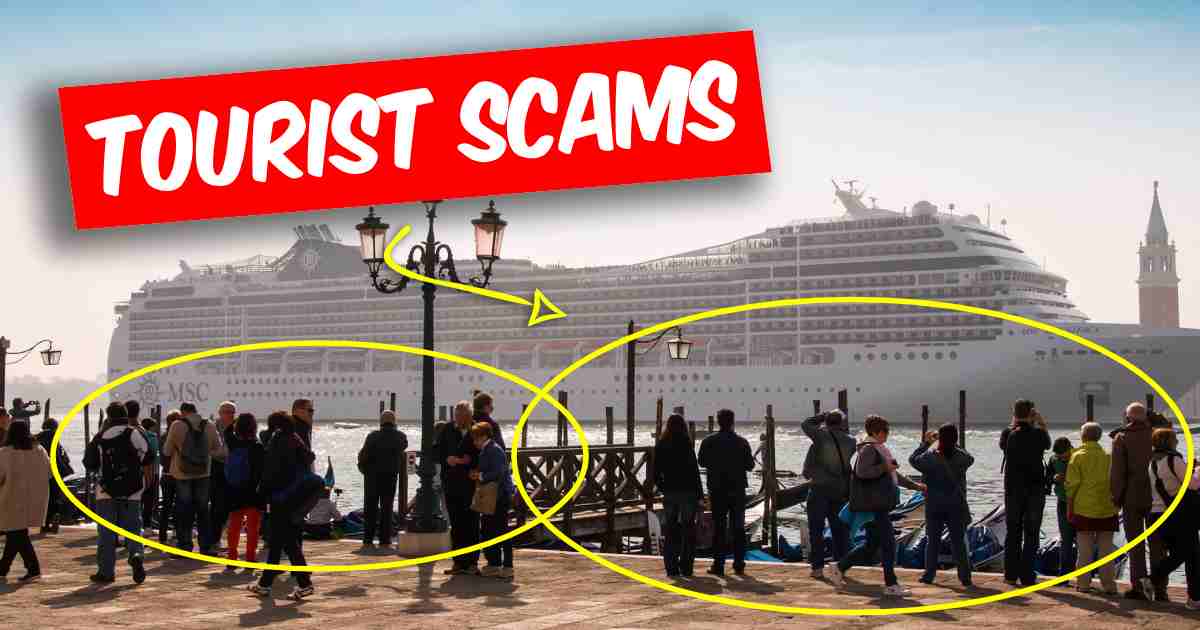Think you can spot a sneaky cruise scam? Think again! Scammers are getting shockingly crafty, using tricks to drain your hard-earned cash and turn a dream cruise into a nightmare. From fake Uber drivers and cruise duck scams to phony excursions and impersonating the crew, they’ll stop at nothing to sink your cruise plans.
How can you stop scammers from ruining your cruise vacation? What red flags should you look for to stay one step ahead of their sneaky tactics? I’ve compiled the top cruise scams to help you protect yourself and ensure smooth sailing from start to finish.
15 Sneaky Cruise Scams Every Cruiser Needs to Watch Out For

Imagine arriving in port for an ‘exclusive’ shore excursion you booked through a Facebook group, paying far less than the price offered by the cruise line. But when you get there, no one shows up, leaving you stranded at the dockside. Your heart sinks as you realize you’ve fallen victim to a scam.
Cruise scammers constantly devise new methods to con travelers, so even seasoned cruisers can get fooled. Read on to discover the cunning frauds cruise scammers use.
Fake Uber/Lyft driver scam

Full of excitement, you step off the cruise ship, ready to explore a new port. Then, a friendly local approaches, with a smartphone in hand, “Hey, need a ride, I’m an Uber driver.” After showing what looks like an official app, you hop in thinking you’ve snagged a cheaper deal than a local taxi.
Fake Uber taxi driver scams usually occur when a driver approaches, saying they had to switch cars or offers to drive you for a lower price than regular taxis. Some imposters may convince you to cancel the ride and pay in cash.
Unfortunately, I’ve also read about legitimate, unscrupulous Uber drivers scamming cruisers. A trick they use is to claim a glitch in their app and ask you to pay cash. Or they may try to convince you that you mistakenly chose the cash payment option (when you didn’t). Another baloney claim is that you must pay tolls during a ride.
I read about one group of travelers, and the real Uber driver claimed a “cleaning fee” due to supposed messiness or vandalism. What should have been a $50 ride turned into a $150 taxi scam.
How can you protect yourself from fake Uber driver scams? First, always use the official app to verify the driver’s identity and license plate before entering. Second, only communicate with the driver through the app—don’t give out personal information. Third, take a photo of the interior when you enter and leave.
Taxi fare scam

Charging inflated fees is a common scam involving taxi drivers. You hail a cab, agree on a price, and head to your destination. Suddenly, the driver claims the fare is higher, wants to add bogus fees, or refuses a credit card payment. With no meter or fare sheet, you have little choice but to pay the exorbitant fare.
Cruise forums are full of horror stories of getting conned out of extra dollars for fares. It could be that the driver “forgets” to start the meter, claims it’s broken or takes longer than normal routes.
I read a news article about taxi drivers targeting Costa Maya and Cozumel, Mexico, cruisers. During the ride, they try to sell fake tickets to all-inclusive resorts, claiming to give whopping discounts. They then drop passengers at a random place and speed off, leaving them stranded. I’m sure that each cruise port has similar taxi scams happening.
How can you protect yourself from taxi fare scams? Always use licensed, metered taxis where possible. Remember that taxis in some Caribbean cruise destinations don’t have meters. Therefore, always confirm the fare before the ride.
Bump and break scam

Thinking of shopping for souvenirs or gifts in the port? If so, be careful of the classic “bump and break” scam. You accidentally bump into something, causing it to fall and break. The store owner immediately demands you pay for it. Sounds fair, but it’s part of an elaborate side hustle.
The low-value items are strategically placed where they’re easy to knock over. In addition, they’re overpriced. So you end up paying for a tacky, broken souvenir with no real value.
One cruiser wrote that they “accidentally” knocked a figurine over, and the shop owner demanded 500 pesos. Thankfully, the crummy item still had its original price—200 pesos. They handed over 200 pesos and left.
How can you protect yourself from the bump-and-break scam? Try to be extra vigilant in shops and remove backpacks to avoid knocking anything over. Unfortunately, there’s little you can do except negotiate a lower price and leave.
Cruise duck scam

Con artists exploit the cruise duck craze by collecting payment for ducks that never arrive. It may sound “quackers,” but some cruisers enjoy hiding rubber ducks on ships for others to find. Therefore, buying these are an integral part of cruise preparations.
The racket goes like this: The trickster uses a fake Facebook profile and joins several cruise groups. They post pictures of a vast collection of cute, colorful ducks—some of which look handmade. Anyone wanting to buy some just has to DM them. They send money, and, of course, the duckies never arrive.
Some charlatans claim that their cruise was canceled or that they cannot go and are selling their stash for a discounted price.
How can you protect yourself from this lame-duck scam? Quite simply, don’t buy rubber ducks on Facebook groups. If you’re keen on cruise scavenger hunts, buy your duckies from online sellers like Amazon or eBay, and don’t let scammers duck and dive into your wallet.
Fake website or phone number scam

Scammers set up fake websites that look worryingly similar to legitimate cruise companies. They post fake customer service numbers on social media or forums or get them to appear in Google search results. These are set up to steal identities, commit fraud, or give phony advice.
One traveler wrote that she Googled the cruise line number and called the first one in the results. The “helpful” assistant told her that an embarkation fee of $298.54 was outstanding. Customer service said they’d have to pay this before proceeding. However, as it was close to the departure date, she was asked to make a wire transfer to a new bank account.
Needless to say, it was a fake number, and the scammer owned the bank account. Other fraudsters may ask for credit card or bank details or claim you owe deck fees or other made-up charges.
How to protect yourself from the fake phone number scam? If you want to contact the cruise line, go directly to their website or get the phone number from the official booking information. Don’t rely on internet search results.
Slot pull scam

Want to win big in the cruise ship casino? If you join a fake slot pull group on Facebook, you will likely leave the casino cleaned out and busted.
This scam involves a crook organizing a group casino event and asking for prepayment to join. Of course, the event never happens, and your ‘investment’ sinks into the deep ocean. In other cases, scammers pocket the winnings for themselves.
Of course, slot pulls aren’t always scams, and many cruisers love the excitement and meeting new people. But like all gambling, there’s an element of risk. One cruiser lamented: “We have fun meeting fellow cruisers, but we’ve never left with more money than we put in.”
How to avoid slot pull scams: Only participate in slot pulls organized by reputable groups.
Sip and paint scam

Sip and paint parties are another scam prevalent in Facebook groups. In this case people meet up to create a painting while enjoying a drink. The idea behind these events is to combine fun, creativity and socializing in a relaxed atmosphere.
Like most phony cruise events, you must pay upfront for a “once-in-a-lifetime deal.” In most cases, the event never occurs. Some onshore paint-and-sip events hit attendees with a participation fee, overpriced drinks, or charge for supplies.
Like other scams making the rounds of the Facebook cruise groups, always ensure the event is properly organized by a reputable group.
T-shirt or custom item scam
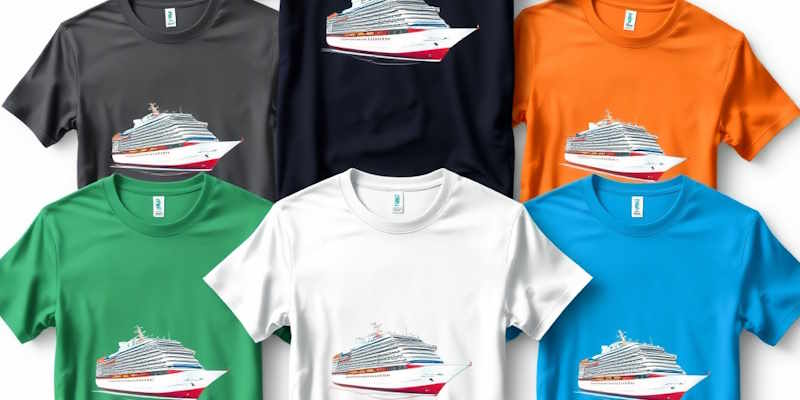
Facebook groups are home to another scam targeted at the cruise community: custom cruise items. Do you want a customized t-shirt, shot glass, or refillable cup for your cruise? Just beware of scam artists who are willing to take your money but not deliver the goods.
Remember, plenty of reputable companies will create customized cruise items. Always be wary of prepaying from people with weak profiles on cruise Facebook groups.
Prepaid raffle scam
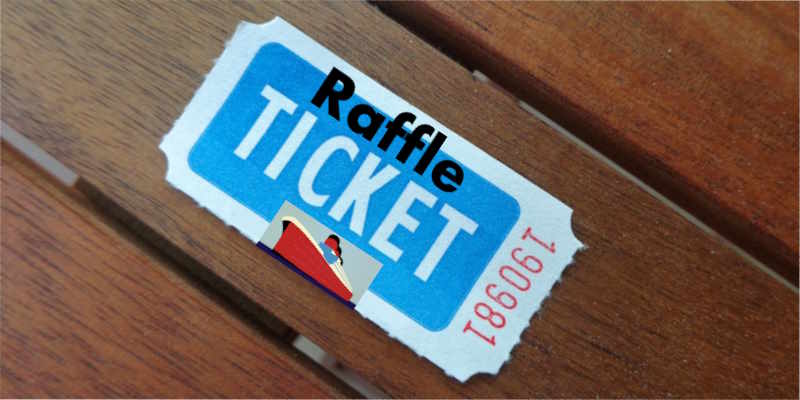
Another trick to get you to part with cash for no return is entering a scam cruise raffle. For a seemingly small amount of money, you can hope to win cruise gift cards, cruise giveaways, money, drink packages, luxury items, or cruise upgrades. Common sense dictates that you avoid prepaying for any online offer from unreputable sources.
To avoid being duped, stick to raffles that cruise lines or affiliated organizations run.
Tequila tasting and shopping scam

In this crafty tourist scam, you’re promised free shots of tequila, rum, or other locally-produced liquor. The bartender pours their finest samples of high-end, top-shelf spirits. As a sweetener, they offer a fantastic discount if you buy a bottle. Impressed by what you just sampled, you buy a bottle. In reality, what you buy is cheap booze disguised in a fancy bottle.
One cruiser learned the hard way after planning a tequila-themed party at home. Instead of wowing guests with authentic tequila, it tasted like jet fuel, nothing like what they sipped in Mexico.
How to avoid liquor scams on shore excursions: By all means, try free tequila or rum shots on a Caribbean cruise. Instead of buying from a shady store, note the brand and purchase it in a reputable duty-free shop.
Rental car damage scam
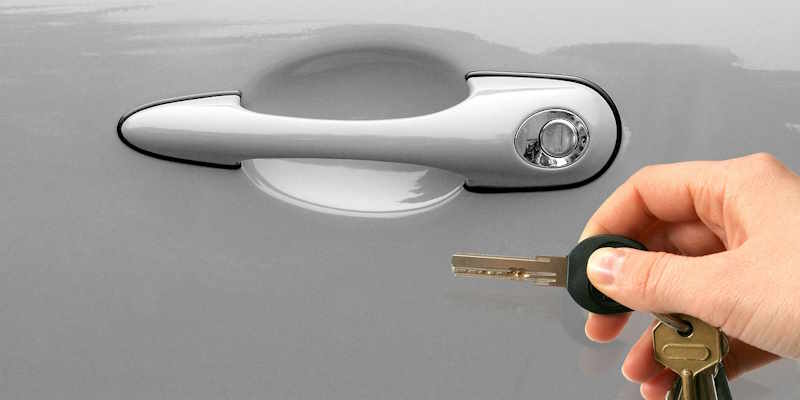
The rental car damage racket is a common scam hitting cruisers exploring ports by car. After you return the vehicle, the unscrupulous rental agency fabricates damage claims—a small bump, tiny scratch, or dent. They then want to charge an exorbitant fee for the damage, and they’ll show you the contract you signed.
This scam works on cruise tourists as the fraudsters know you’ve limited time to return to the ship. They may threaten to call the police, and suddenly, you feel pressured to pay a whopping sum for a tiny mark. They may even be “helpful” and reduce the claim amount.
How to avoid the rental car damage scam: Always check the vehicle’s condition before driving off and take pictures of any damage. Working with well-known rental companies rather than local ones usually helps avoid rental scams.
Cruise shore excursion scams

Some of the worst outright scams in port involve shady shore excursion vendors. They lure cruise passengers in with cheap prices and promises of exciting experiences. However, once on the bus, you quickly realize you’re in for a bumpy ride—financially and morally.
Quality plummets off a cliff, and you get hit with surprise fees. Then you’re at their mercy—after all, you depend on them getting you to the ship in time. What promised a wonderful day in port turns into a stressful situation.
I’ve also heard plenty of sad tales of cruise passengers waiting for over an hour or longer, and the tour guide never showed up or answered the phone.
How to avoid shore excursion scams: Either book through the cruise line or look for a reputable online vendor that gets excellent reviews. Some sites I use are TripAdvisor, Cruise Critic, and Viator.
Free cruise scam
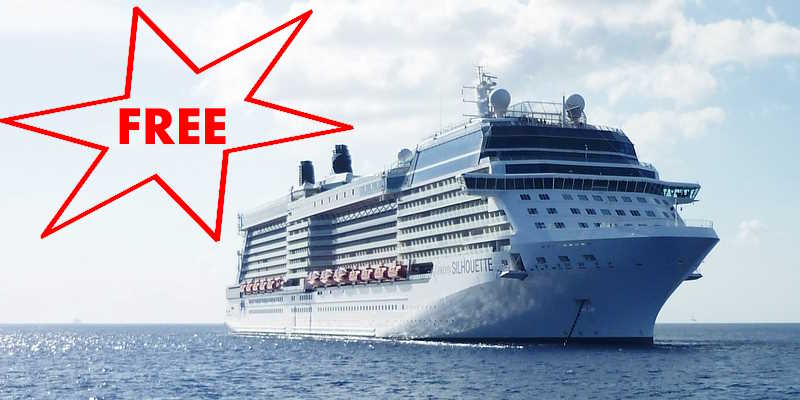
Fraudulent cruise ship employees also offer “fantastic” vacation packages on social media. Common scams involve entering a survey, reposting a post, or giving feedback. The catch? You’ll need to speak to someone when you’ve “won.” They’ll dupe you into paying port fees or other costs that don’t exist.
Sometimes, the fraudsters send notifications to people that they’ve won a cruise, even though they never entered a competition. The number to call to claim the prize is a foreign premium line masked as a local number, and the victim is kept on hold for a long time. Ouch!
How to avoid the free cruise scam: First, be highly skeptical of unsolicited offers for complimentary cruises. Also, winners of legitimate free cruises should never have to pay any fees to claim the prize. If unsure, contact the official cruise line directly to check out the deal.
A word of advice: Be cautious when clicking on links in emails or social media posts. Always verify the source and ensure it’s from a trusted, legitimate entity before proceeding. If in doubt, navigate directly to the official website instead of using the provided link.
Impersonating crew scam

Believe it or not, setting up fake Facebook profiles pretending to be cruise ship employees is increasingly popular. The scammers steal photos of actual crew members and captains and pretend to help cruisers. They solve problems, make bookings, take reservation fees, and offer last-minute deals on flights or cruises.
Unfortunately, getting duped by fake cruise line employees only results in raw deals and money loss. Not to mention the disappointment of not getting the cruise experience you hoped for.
How to avoid fake cruise line employee scams: Check out their Facebook profile. Typically, bogus crew members have few followers, do not have many pictures, and rarely post anything worthwhile.
Overcharging cards in port

Don’t become a victim of fraudulent sellers who overcharge your credit or debit card without your knowledge. The scam usually works this way: They say there’s no signal for the card machine. So, they take your card away, change the price, and make the contactless payment.
Be wary of using ATMs in ports due to card skimming. Cruisers have been scammed because someone inserted a card skimmer into the slot. This reads and copies card information that scammers use to clone cards.
What about contactless or “tap and go” cards? Theoretically, someone can get close enough to swipe cash from your card in a crowded place. The money pinching happens when they “accidentally” bump into you with a tap-and-go card reader. Therefore, one of the things I usually pack for a cruise is an RFID blocker wallet.
Avoiding Scams is Only the Beginning: Don’t Fall for Cruise Rip-Offs
While these scams can be frustrating and financially draining, it’s worth remembering that not all challenges come from scammers. Even onboard the ship, there are plenty of ways cruisers can be caught off-guard by overpriced services or hidden fees. I’ve learned from my own experience that it’s not just the big scams you need to watch for—it’s also about knowing how to navigate the cruise experience smartly.
That’s why I recommend reading my article on Cruise Ship Rip-Offs, where I break down everything from overpriced drink packages to those ‘exclusive’ shore excursions that cost more than booking independently. Trust me, you’ll want to avoid these pitfalls, too!
It’s not just first-timers that get caught out; even experienced cruisers can miss the finer details. To help you make the most of your trip, check out my guide on Common Mistakes New Cruisers Make—packed with tips that every cruiser can use to avoid costly errors.
Finally, one thing that experienced cruisers know better than anyone else is the importance of having the right insurance coverage. My article, Travel Insurance for Cruisers: Expert Tips from Experienced Cruisers, is packed with invaluable advice. From personal experience, having the right insurance has saved me from financial disaster more than once.
How to Spot a Scam Before It Happens

Too good to be true? Well, it probably is. Watch out for unsolicited offers with exclusive deals offering great rewards for a small price. Additionally, aggressive or high-pressure tactics, like having to make quick decisions, usually mean something bogus is going on.
Trust your instincts—if it smells fishy, stay clear of the bait. If not, you’ll fall hook, line, and sinker into a scammer’s tactics.
What to Do If You’ve Been Scammed
If you’ve been a victim of an outright scam, act fast. First, contact your card provider to block your cards. Next, the fraud should be reported to the local authorities and provide as much information and evidence as possible. Then, inform the cruise line, as they have procedures to assist anyone on board who was scammed in ports.
Related articles:

